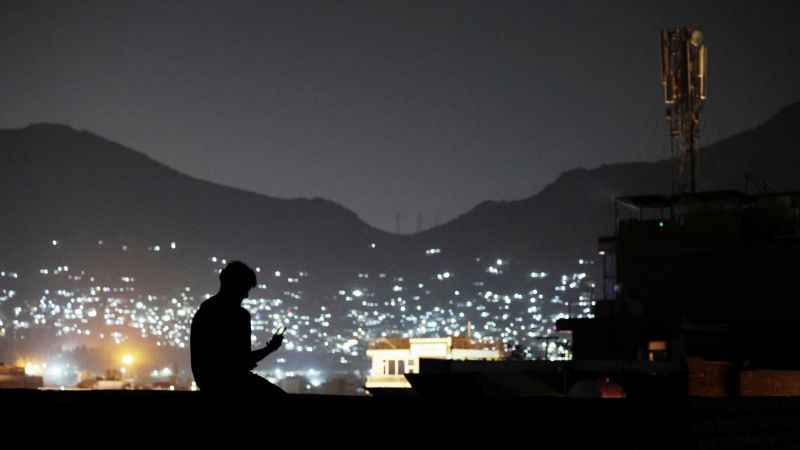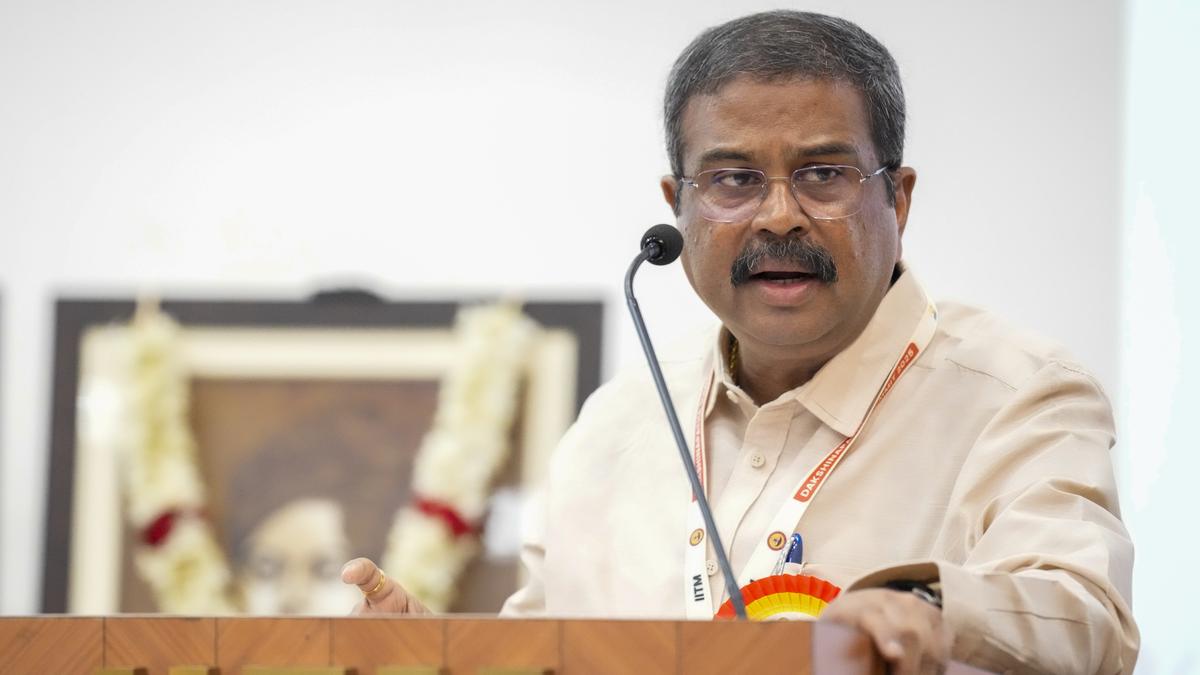
For 48 hours, the Taliban appeared to turn back the clock in Afghanistan with a directive to cut off the internet and phone networks, disconnecting millions of people from the world outside.
Afghans lost the ability to contact anyone within or beyond their borders, sending waves of panic worldwide as families, colleagues and friends realized an entire nation had gone dark.
Banking services froze, businesses ground to a halt, flights to and from major airports were canceled, money markets failed, and companies and aid groups lost contact with clients and staff.
“The greatest despair was that people feared Afghanistan had once again been plunged into conflict,” reported Hewad Watander, a journalist in the capital Kabul, who uses a pen name to avoid Taliban retribution.
“People appeared as if their spirits had left their bodies. Any sense of hope seemed to have completely vanished.”
The unprecedented internet blackout came without public warning and was immediately attributed to an order from the Taliban, a repressive Islamist regime that has stifled personal freedoms, particularly those of women and girls, since taking power in 2021.
Just two weeks earlier, Taliban leaders in the north said they had cut the internet to several provinces “to prevent immoral activities.” An “alternative system will be established within the country for essential needs,” said Haji Zaid, the governor of northern Balkh province.
He said the order came from the Taliban’s Supreme Leader Mawlawi Haibatullah Akhundzada, a powerful and reclusive figure who issues edicts from the southern city of Kandahar.
No reason was given for the nationwide shutdown that started just after 5 p.m. on Monday. Nor for the sudden reconnection on Wednesday, leaving rumors on social media to fill the void.
Afghans are starting to share the sinking grief they’ve felt over the last few days, as they realized there was no way to legally or safely get a message in or out.
For many, it has only now become clear how much power the regime has to isolate them in their own homes, particularly women, who are banned from work, school and even some public places.
For the Taliban, the episode possibly carries the lesson that attempting to turn back time on a population that’s grown up with the internet is much harder than just flicking a switch.
‘Total internet blackout’
On the US east coast on Monday morning, Doug Madory, director of internet analysis at Kentik, a network monitoring company, received a message from a contact that Afghanistan was about to go dark. Within an hour, he watched as data showed connectivity fall off a cliff.
“It was just a wholesale disconnection,” he recalled.
Internet watchdog NetBlocks reported a “total internet blackout” affecting some 43 million people.
Afghans who were normally active on social media – Facebook, Instagram, X and TikTok – fell silent. WhatsApp messages sent from abroad remained unread. Local and international phone calls failed to connect. Taliban leaders said nothing.
Members of the Afghan diaspora spent hours, and sleepless nights, trying to call and text relatives, friends and colleagues back home.
Fatima Yousufi, a former player for the Afghanistan national soccer team who fled to Australia, said her family had been trying to reach her aunt, a single mom who relies on money sent from abroad to feed her four children.
“We won’t know how she’s doing, how we can help her. Or how she can let us know if she needs money, or if she’s out of food,” said Yousufi on Tuesday.
For many girls and women, the internet has become the only way to connect and defy the Taliban’s ban on education beyond sixth grade.
Mati Amin, the co-founder of SOLAx, which educates Afghan girls and women via WhatsApp, said they’d seen a “precipitous decline” in lessons requested from users in Afghanistan.
“We’ve got users in all 34 provinces,” he said Tuesday. “It’s absolutely clear that there’s not a single province unaffected.”
Hamida Aman, founder of Radio Begum, which broadcasts in Afghanistan, said the station and all local radio had been cut off. Satellite service Begum TV, which operates from Paris, was still going to air.
“Satellite TV remains the only window to the world now,” she wrote on LinkedIn on Tuesday.
A hit to business
Internet connectivity is one measure of a country’s progress, and earlier this century things were looking up for Afghanistan. Money was flowing in, as the US and its allies attempted to rebuild civil society destroyed by the Taliban’s brutal rule from 1996 to 2001, even as fighting and insecurity still plagued swathes of the nation.
Twenty years later, after the Taliban again seized control following the chaotic withdrawal of Western forces in 2021, many wondered how long the internet, and its vast well of vice, would be allowed to remain.
But the last few days have shown that Afghanistan needs the internet.
The blackout severely disrupted daily life, according to news agency TOLO News, which filed updates on social media. Images broadcast online show queues outside banks as customers tried to withdraw cash. Online payments failed; businesses couldn’t contact suppliers or staff.
Abdul Hamid, a 37-year-old money exchanger in Kabul, said he wasn’t able to buy or sell currency because he didn’t know the rates. He told CNN he spent four hours in a taxi to get to the main market to check the figure. The next day he didn’t bother opening the shop, and instead sat and contemplated life with no income.
Afghans desperate for a signal drove to the border with Pakistan, where it was possible to connect at the Torkham crossing. Afghan SIM cards and mobile networks seemed to be working normally, according to two Pakistani administrative officers posted there.
Sabir Shah, an Afghan fruit dealer based in Peshawar, Pakistan, said he’d been unable to reach any suppliers in Afghanistan through phone or WhatsApp.
Normally, large quantities of grapes, pomegranates, and apples are sent from Afghanistan to Pakistan, but payment systems had been disrupted, as well as communication.
“It’s become very difficult for me to know how many trucks are coming from there and where I’m supposed to supply them,” he said. “The Afghan government needs to understand that the internet and telephone are no longer luxuries — they are necessities of life.”
Urgent calls for a reversal to the shutdown came from the United Nations, as well as rights groups Human Rights Watch and Amnesty International.
Richard Bennett, the UN’s special rapporteur for Afghanistan, warned that disruption “may sink the fragile economy with massive human rights implications.”
Sanctions, drought and the forced return of millions of refugees from Iran and Pakistan had worsened food shortages in the already impoverished country, from which international aid has been withdrawn in recent years.
Still, in the cities, generations of young Afghans – including Taliban loyalists – have grown up with the internet. In 2025, the idea that people can walk around without any means to phone anyone seems completely foreign.
“It’s a strange feeling to be without your phone,” said Maimoona Durani, a 33-year-old primary school teacher in Kabul, using an alias for safety reasons.
“The phone network was also shut, not just internet. No one has landlines anymore but even those weren’t working. The inability to just pick up the phone and ask someone how they are or let people know that you are okay – that’s difficult,” she said.
Relief and anger
Samira, a 19-year-old student from Kabul, was in a religious education class on Wednesday when a cleaner entered the room and whispered something to her teacher, who ran out, and then came back minutes later, beaming with her phone.
After almost 48 hours of darkness, the internet was back.
“Some of the girls who had their phones in their bags began turning them on and they were all so happy,” said Samira, who uses one name for safety reasons.
She didn’t have her phone on her, so asked to be excused early.
“I walked so fast that I reached home at least 5 minutes faster than other days. On the way I saw almost everyone busy with their phones. Some people were talking on their phones and some others were scrolling,” she said.
Fawzia Rahimi, 52, a housewife from Kabul, whose daughters live in the US, said she was sitting near the window with a headache from lack of sleep when suddenly her phone beeped with missed messages.
“I picked up my phone and called my daughter on WhatsApp. It was midnight in the US; she was still awake, crying, because she hadn’t heard from us for three days. I can’t tell you how happy I felt when I heard her voice.”
Rahimi told CNN that speaking to her family is the “only way to keep my days happy.”
But beneath the joy and relief of reconnecting with family runs a deep undercurrent of anger that a basic human right of connection could be easily – and abruptly – taken away.
Before the nationwide shutdown, Nigin, an Afghan artist, educator and activist, lost her internet connection in the north. She raced to buy a router so she could stay in touch with her students – and filed an essay for a special edition of the online magazine Usawa, warning that worse was to come.
“The situation is beyond urgent,” she wrote in the article, published last week. “We are on the edge of being buried alive.”
When the internet dropped out nationwide, her editor Shikha Sawhney Lamba tried to reach her and other contributors. “They must have panicked,” Lamba told CNN from her home in Hong Kong.
Nigin told her later that, yes, she had been alarmed by the cut but had resolved to check on her students.
“I began walking, on foot, from house to house, crossing long distances… Wherever I went, I left a message: We continue,” she said in an Instagram message shared with CNN.
“Seeing the pale, frightened faces of my friends and students filled me with rage. I made a promise to myself: Either death or hope.”
Mariam Solaimankhil, an exiled former member of Afghanistan’s parliament, said the shutdown caused a lot of mental anguish. People had become agitated. Some had slid into depression.
She said it was clear the Taliban was trying to remove outside influences so it could return to its brutal rule of the 1990s.
“The more that they cut off the people, and the world, from Afghanistan, the more that they can do,” she said. “So, if a public flogging happens or someone gets killed, where’s the proof? It’s not going to be there anymore.”
Some people inside Afghanistan managed to get messages out via Elon Musk’s Starlink satellite internet network – and as the days wore on, desperate families had talked about trying to smuggle in more Starlink units, Solaimankhil said.
Starlink isn’t officially available inside Afghanistan, according to its website. CNN’s request for comment wasn’t answered.
Tom Worthington, from the Australian National University’s School of Computing, said circumventing a shutdown that appeared to have been ordered by the country’s Taliban leader would be risky for ordinary Afghans.
“If you’re engaged in a war against the Taliban, (Starlink) would be useful, but in terms of human rights, helping educate the local population, it wouldn’t be, because giving them the unit would place them in so much danger,” he said.
Worthington said filtering “immoral” content from the internet – if that was the motivation – would be difficult for any government, given the volume circulating online.
The popular use of virtual private networks also shows it’s relatively easy to reach beyond a government’s control – if the internet is working.
On Wednesday, when the order came to reconnect, traffic surged beyond normal levels. Madory from Kentik, the internet monitoring company, said reconnecting would have been a manual process completed by fewer than 10 service providers.
He has seen this kind of shutdown before, as far back 2011, when the Egyptian government pulled the plug on the internet during the pro-democracy “Arab Spring” protests.
“That outage kind of ushered in this era that we’re in now where there’s all this government manipulation of communications,” said Madory. “The problem with that is that it’s very harmful to the government’s operations, the businesses. It really kills the economy.”
Former US Ambassador to Afghanistan Zalmay Khalilzad seemed to suggest on X that not all Taliban ministers were behind the outage.
“Even their own ministers are dumbfounded,” he wrote on Wednesday, before the reconnection. “I am not sure the leadership understood the consequences of its decision before taking it.”
If the intent was to frighten the population, the move succeeded.
Sahar Fetrat from Human Rights Watch said friends had told her the two days offline felt like living in Afghanistan 30 years ago.
“Young girls have written to me that we should be their voice. (The) internet is the last thing that slightly changes their situation than those of prisoners,” she wrote in a text message to CNN.
“They are worried this may happen again.”



